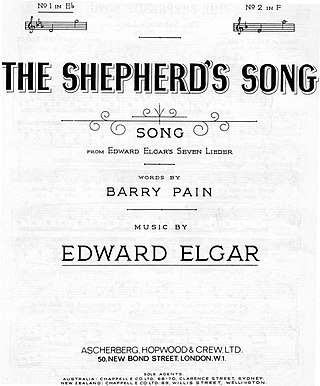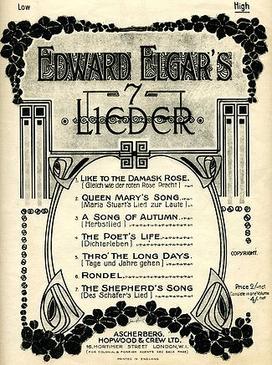Related Research Articles
The Crown of India, was a masque, an elaborate theatrical presentation, staged in 1912 to celebrate the visit the preceding December of King George V and Queen Mary to Delhi for their coronation as Emperor and Empress of India. For this masque, the English composer Sir Edward Elgar wrote the music as his Op. 66, with a libretto by Henry Hamilton. The masque consisted of two tableaux: "The Cities of Ind" and "Ave Imperator!".
"Pleading" is a poem written by Arthur L. Salmon, and set to music by the English composer Edward Elgar in 1908, as his Op.48.
Was it some Golden Star? is a poem written by Gilbert Parker, published in Volume I of a series of poems called Embers. It was set to music by the English composer Edward Elgar in 1910, as his Op. 59, No. 5.
Oh, soft was the song is a song with words by Gilbert Parker set to music by the English composer Edward Elgar in 1910, as his Op. 59, No. 3. It is the second and last verse of a poem At Sea which Parker published in Volume I of a series of poems called Embers. The Opus 59 songs were part of a song-cycle of six romantic songs by Parker that was never completed – Nos 1, 2 and 4 were never composed. The other songs were Was it some Golden Star? and Twilight. The songs were originally written with piano accompaniment, but this was later re-scored by the composer for full orchestra.

"The Wind at Dawn" is a poem written by Caroline Alice Roberts, and set to music by the English composer Edward Elgar in 1888.

”The Shepherd’s Song” is a song written by the English composer Edward Elgar in 1892. The words are by Barry Pain.
"Rondel" is a song written by the English composer Edward Elgar in 1894 as his Op. 16, No. 3. The words are by Longfellow, a translation of a Rondel by Froissart. The manuscript is dated 4 January 1894.
”Like to the Damask Rose” is a poem either by Francis Quarles called "Hos ego versiculos", or by Simon Wastell called “The flesh profiteth nothing”. It was set to music by the English composer Edward Elgar in 1892.
”The Poet’s Life” is a song written by the English composer Edward Elgar in 1892, with words by "Ellen Burroughs".
"The Blue Mountains" is a poem written by Alfred Noyes, and set to music by the English composer Edward Elgar. It was one of the songs written to be performed in the Pageant of Empire at the British Empire Exhibition in Wembley Park, London, on 21 July 1924.
"Shakespeare's Kingdom" is a poem written by Alfred Noyes and set to music by the English composer Edward Elgar. It was one of the songs written to be performed in the Pageant of Empire at the British Empire Exhibition on 21 July 1924.
"The Islands" is a poem written by Alfred Noyes, and set to music by the English composer Edward Elgar. It was one of the songs written to be performed in the Pageant of Empire at the British Empire Exhibition on 21 July 1924.
"The Heart of Canada" is a poem written by Alfred Noyes, and set to music by the English composer Edward Elgar. It was one of the songs written to be performed in the Pageant of Empire at the British Empire Exhibition at Wembley Park on 21 July 1924.
"Merchant Adventurers" is a poem written by Alfred Noyes, and set to music by the English composer Edward Elgar. It was one of the songs written to be performed in the Pageant of Empire at the British Empire Exhibition on 21 July 1924.
"The Immortal Legions" is a poem written by Alfred Noyes, and set to music by the English composer Edward Elgar. It was one of the songs written to be performed in the Pageant of Empire at the British Empire Exhibition on 21 July 1924.
"A Song of Union" is a poem written by Alfred Noyes, and set to music by the English composer Edward Elgar. It was one of the songs written to be performed in the Pageant of Empire at the British Empire Exhibition on 21 July 1924, though this particular song was not performed at the Pageant.
The Pageant of Empire was the name given to various historical pageants celebrating the British Empire which were held in Britain during the early twentieth century. For example, there was a small Pageant of Empire at the town of Builth Wells in 1909. In 1911 a giant Pageant of Empire took place at the Festival of Empire at the Crystal Palace in Sydenham, where thousands of amateur performers acted out historical scenes. The most notable was the Pageant of Empire which took place in London in 1924.

Seven Lieder is a set of songs by the English composer Edward Elgar published together in 1907, by Ascherberg, Hopwood & Crew Ltd.

"In Moonlight" is a song with music written by the English composer Edward Elgar in 1904 to words from the poem "An Ariette for Music. To a Lady singing to her Accompaniment on the Guitar", by Percy Bysshe Shelley (1792-1822) and published in 1832.
Pageant of Empire is the title given to a set of songs, to words by Alfred Noyes, written by the English composer Sir Edward Elgar and given important positions in the Pageant of Empire at the British Empire Exhibition at Wembley Park.
References
- ↑ Kennedy, Michael (1987). Portrait of Elgar (Third ed.). Oxford University Press. pp. 181, 356. ISBN 0-19-284017-7.
- ↑ Moore, Jerrold Northrop (1984). Edward Elgar: A Creative Life. Oxford University Press. p. 768. ISBN 0-19-315447-1.
- Foreman, Lewis (ed.),"Oh, My Horses! Elgar and the Great War", Elgar Editions, Rickmansworth, 2001 ISBN 0-9537082-3-3
- Richards, Jeffrey "Imperialism and Music: Britain 1876-1953" (Manchester University Press, 2002) ISBN 0-7190-4506-1